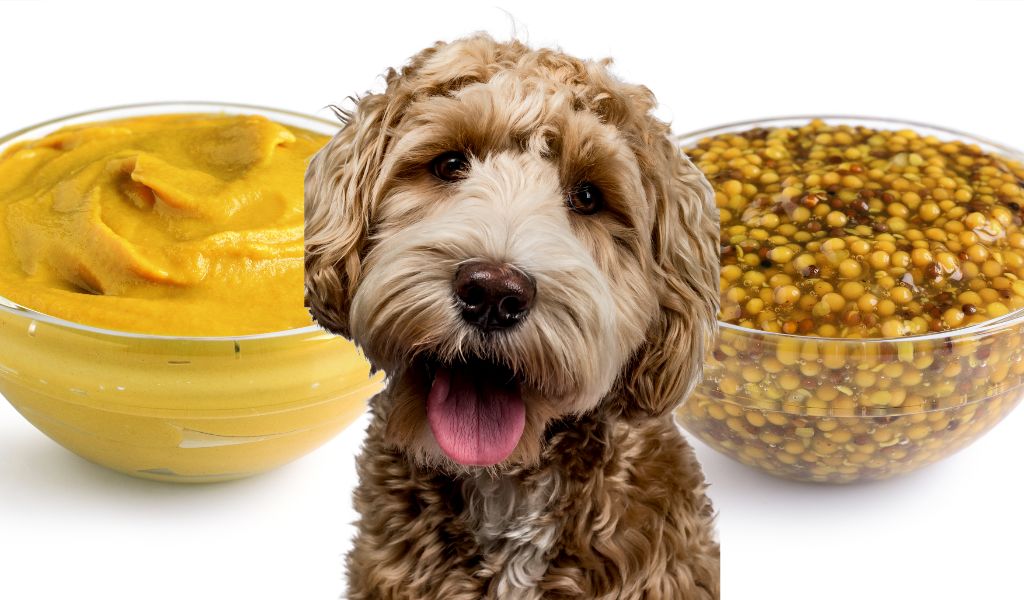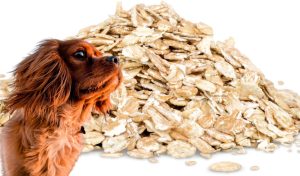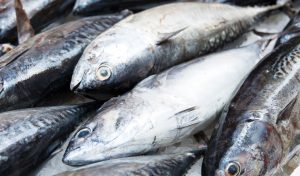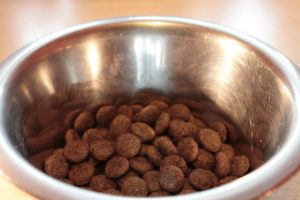Mustard is a condiment widely used in cooking and as a dressing, but the question remains whether it’s safe for dogs to consume.
With more and more pet owners looking to incorporate human foods into their dog’s diet, it’s essential to understand what foods are safe and which ones could be harmful.
Mustard is not suitable for dogs to eat. The constituent ingredients can be harmful to dogs and can lead to salt toxicity and digestive irritations or worse. Avoid letting your dog have mustard and find a more appropriate condiment for your pet.
Importance of understanding what human foods are safe for dogs
Dogs have unique dietary needs and can have adverse reactions to human foods that are safe for consumption by people but which are not always suitable for canines..
As pet owners, it’s crucial to educate ourselves on what foods are safe and which ones should be avoided to keep our furry friends healthy and happy.
This blog post aims to provide pet owners with a complete guide on the topic of whether dogs can eat mustard and the potential impact it may have on their health.
The goal is to help pet owners make informed decisions about their dog’s diet and prevent any adverse reactions.
The ingredients of mustard and their effect on dogs
What mustard is made of
Mustard is a condiment that is typically made from mustard seeds, vinegar, salt, and various other spices and flavourings.
The exact ingredients and ratios vary depending on the type of mustard being produced, but the base ingredients remain the same.
Different variants of mustard, such as Dijon mustard or honey mustard, may contain other ingredients that could be potentially dangerous for dogs if consumed in large quantities.
The main ingredients (mustard seeds, vinegar, salt) and their impact on dogs
Mustard seeds and vinegar are generally considered safe for dogs to consume in small quantities.
However, the high salt content in mustard can lead to excessive thirst and potentially lead to salt toxicity if consumed in large amounts.
Additionally, the vinegar used in mustard production can irritate a dog’s digestive system, leading to symptoms such as vomiting and diarrhea.
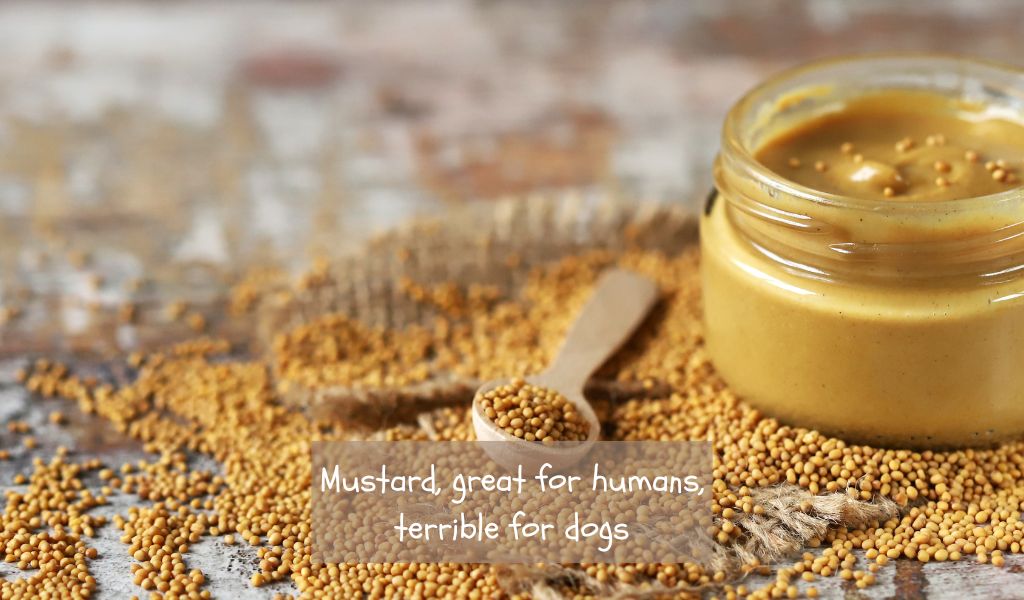
The chemical allyl isothiocyanate and its potential harm to dogs
Mustard seeds contain a chemical called allyl isothiocyanate, which can be toxic to dogs if consumed in large amounts.
This chemical can cause respiratory distress, abdominal pain, and vomiting in dogs.
It is important to note that this chemical is not present in all types of mustards, but it is found in some, so caution should be taken if feeding a dog mustard.
Added ingredients that can be harmful to dogs (xylitol, onions, garlic)
Some types of mustard contain ingredients that are toxic to dogs, such as xylitol, onions, and garlic.
These ingredients can cause severe health problems, such as liver failure and anaemia, in dogs.
It’s essential to check the label of any mustard product before giving it to your dog and avoid those that contain these harmful ingredients.
Is mustard safe for dogs to eat?
Mustard is not the best food for dogs, and it should only be given in small amounts as a treat.
There are much more suitable foods and condiments but if you are going to feed your dog mustard, it is important to consider the following:
Why serving size is important
The serving size of any food, including mustard, is crucial when it comes to determining its safety for dogs.
Consuming even a small amount of a toxic substance can have serious health consequences for dogs so you really need to be mindful of the amount you are giving them and whether its worth the risk.
The appropriate serving size of mustard for dogs
In general, it is recommended that dogs consume only small amounts of mustard, if any at all.
A serving size of no more than a teaspoon of plain yellow mustard may be safe for some dogs while, at the same time could be too much for others.
It is important to observe your dog closely after feeding them mustard and discontinue the practice if you observe any adverse reactions, such as vomiting or diarrhoea.
It’s also important to note that any additional ingredients in the mustard, such as xylitol or onions, can greatly increase the potential harm to your dog.
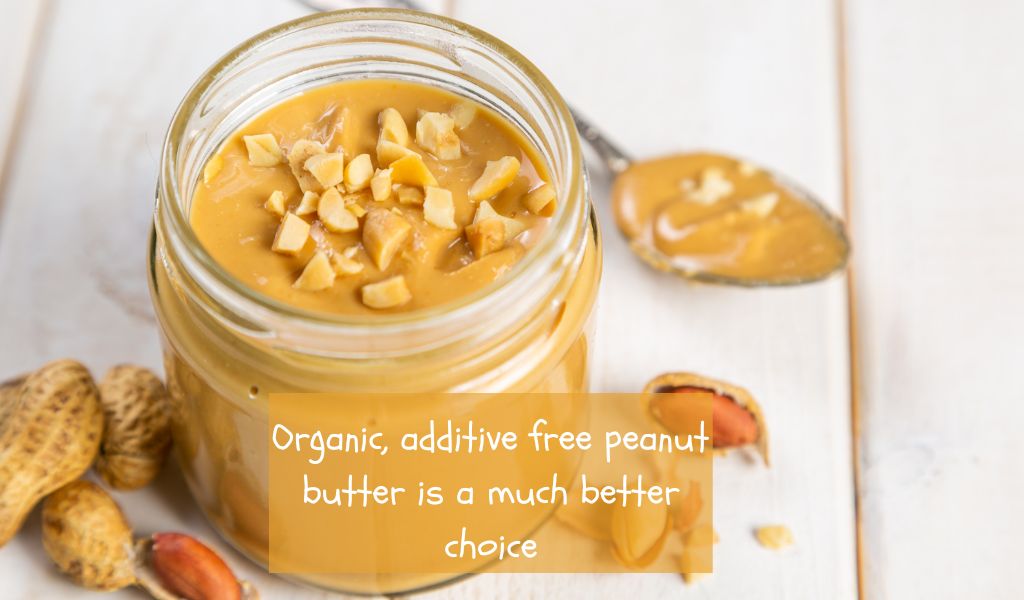
The importance of moderation when introducing new foods to a dog’s diet
It’s essential to introduce any new food to a dog’s diet slowly and in moderation.
This will give the dog’s body a chance to adjust to the new food and reduce the risk of adverse reactions.
If your dog experiences any symptoms such as vomiting or diarrhea after consuming mustard, it’s important to consult a veterinarian immediately.
Always consult a vet before making any changes to your dog’s diet
Before making any changes to your dog’s diet, it’s important to consult a veterinarian.
Your veterinarian can provide personalized advice on what foods are safe and appropriate for your dog based on their individual needs and health status.
Alternatives to mustard for dogs
Options for dog-friendly condiments
While mustard may not be the best option for dogs, there are several alternative condiments that can provide similar flavour and texture while being safe for your furry friend.
Dog-friendly alternatives (honey, peanut butter, pumpkin puree)
Some popular dog-friendly alternatives to mustard include honey, peanut butter, and pumpkin puree.
These options provide flavour and texture that dogs enjoy while being safe for them to consume.
Dog safe treats are always the safest and best choice






The benefits of using natural and organic options
When choosing a condiment alternative for your dog, it’s essential to select natural and organic options whenever possible.
These options are free from harmful additives and preservatives, providing a healthier option for your pet.
It’s important to read labels to avoid toxic ingredients
As with any food, it’s important to read the label of any condiment before feeding it to your dog.
Avoid products that contain toxic ingredients such as xylitol, onions, or garlic.
If in doubt consult a vet for personalized advice
Consult a veterinarian for personalized advice on what condiments are safe and appropriate for your dog based on their individual needs and health status.
Final Words
In conclusion, while dogs may be able to consume small amounts of mustard, it’s important to serve it in moderation and be mindful of the potential risks.
In general, it’s recommended to opt for alternative condiments that are safe and healthier for dogs, such as honey, peanut butter, or pumpkin puree.
It’s essential to consult a veterinarian before making any changes to your dog’s diet, including the introduction of new condiments.
Your veterinarian can provide personalized advice based on your dog’s individual needs and health status.
In summary, while mustard may provide a tasty treat for some dogs, it’s crucial to proceed with caution and choose safer alternatives.
Your dog’s health and wellbeing should always be the top priority, and consulting a veterinarian can ensure that you’re making the best decisions for your furry friend.

